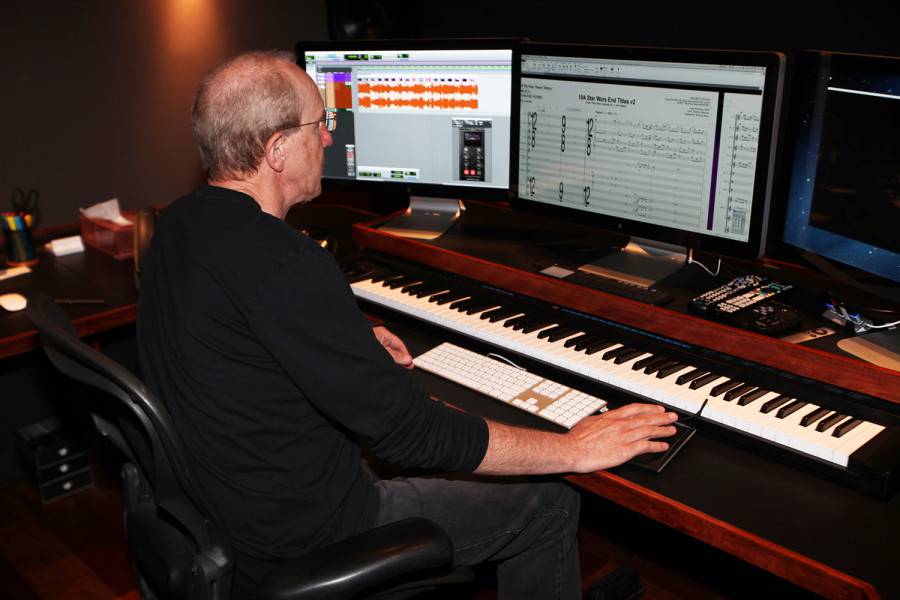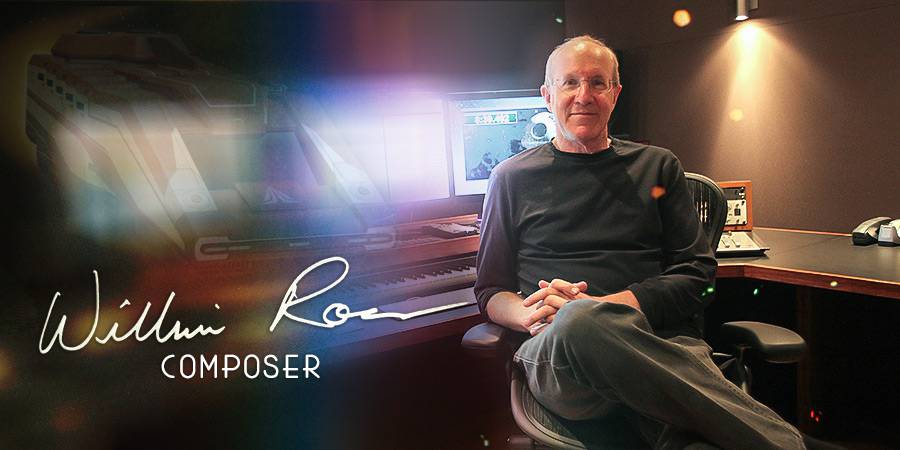 Kris Van de Sande
Kris Van de Sande Fans of both film and film music have heard the talent of William Ross. No, you may not exactly know when and where, but that is part of the beauty of it. Indiana Jones once described his friend Marcus Brody as someone who will blend in, disappear, and I think that is one of William Ross’s great attributes, especially when it comes to music.
Ross has composed the music to many films including The Tale of Despereaux, Ladder 49, Tuck Everlasting, My Dog Skip, among others. You might recognize his name from the soundtrack for Harry Potter and the Chamber of Secrets as Ross adapted the music of John Williams, but more on that down below.
Ross, being as prolific as he is has also won three Emmy Awards, two for his work on the Academy Awards (Oscar) and one for music direction on Streisand: Live in Concert.
I sat down with Bill Ross one afternoon in his studio in Santa Monica on one of his more quieter days to talk about music, his life and an attraction we all know and love: Star Tours: The Adventure Continues, which just recently opened in Tokyo, Japan. Ross had a hand in that experience so we wanted to find out a little more. Not only was it a great experience for me, Bill couldn’t have been a nicer gentleman. Or perhaps it’s that we’re both fellow Gauchos…
EE: Bill, thank you for your time! There’s a lot I want to get to but maybe the easiest way to start is find out just how you came to work in music. Where did it all begin?
Bill: I was born in Ventura, CA, so I’m a relatively local person in that respect. Many of my earliest profound memories are musical. I remember hearing the Tchaikovsky Piano Concerto #1 for the first time at my Aunt’s house. I was overwhelmed. I sat and listened to it over and over again. I had these feelings that I didn’t know what to do with. It was overpowering. I don’t remember exactly how old I was, but I know I was quite young.
After that I asked my parents for piano lessons. I would sit at the piano and play all day. It was something that fascinated me. I wasn’t a great pianist but my heart was in it! As I got older, I never considered a life in music. My parents didn’t have any kind of perspective for a life in the arts. My mother was a nurse and thought medicine would be a good career for me. My father wanted me to be in the Merchant Marines. He grew up on Catalina Island and had been around boats all of his life.
I ended up going off to UCSB (University of California at Santa Barbara) where I was a premed major…lots of sciences and labs. I had to work while I was at college and one of the things I discovered was that I was able to play the piano in blues bands and jazz bands to help make a living. It wasn’t much but it was enough to pay for my books and other expenses. The more I did it, the more I loved it! At a certain point I went to my folks and said “I’m not going to go on to medical school, I’m going to take a break and be a jazz piano player.” [laughs] Now that I’m a parent, I can understand my parents’ reactions! They wanted me to be able to take care of myself in life, and I’m sure they were concerned that the direction I seemed to be headed was one filled with some real uncertainty and challenges.
I did graduate from UCSB and started driving down to Los Angeles to study with people there. Among otheres, I met a man named Allyn Ferguson who is a terrific composer and a wonderfull teacher and arranger named Dick Grove. I also studied for some time with George Trembly. He was a proponent of a Twelve Tone system he had developed which was very interesting.
After a couple years of commuting, I moved to North Hollywood. I was playing in top 40 bands to make a living. I got a call from Allyn Ferguson one day. He said he had recommended me for a piano conductor job with Raquel Welch! I ended up getting the job. It was a wonderful chance to conduct, play piano, write arrangements, and function in that world.
I had an ongoing interest in jazz and “classical” music. I loved to study scores and spent a lot of time doing that. I was very interested in film scores, and at the time there were very few scores available. The only place I could find film scores was what I guess you would call a “black market” in scores! I would hear that someone had a score and I would track them down and hope to get a look at it…or better yet, pay an exorbitant price to get a copy. It was the only way I knew of to get access to that information.
I remember when the Star Wars Suite became available from Fox Fanfare Music. Somehow I had heard that you could purchase a score of that suite. I called them up and ordered the suite. I think it cost $6.00! Today there are some wonderful scores commercially available. The John Williams Signature Series is phenomenal! I would have bought every one of those scores and devoured them.
EE: O_O Wow. So would I!
Bill: Over time, I was able to get other work as a music director or arranger and some jobs orchestrating for TV shows…and one thing led to another. I’ve been very fortunate…very lucky.
EE: You have mentioned Tchaikovsky and Gershwin before as favorites… do you have any other musical inspirations or groups that you love?
Bill: Oh, that list goes on and on! In Jazz, I love the Miles Davis quintet that had Miles, Herbie Hancock, Ron Carter, Wayne Shorter and Tony Williams. What a great band! I love John Coltrane, Bill Evans, Oscar Peterson, Chick Corea….and so many more! In soul, I was, and am, a huge Tower of Power fan. They’re amazing! When my friends were into the Beatles, I was into the Modern Jazz Quartet. In the classical world, there’s Ravel. Mahler, Vaughan Williams and the list goes on. One of the nice things about classical music is that the scores are available so I could get the scores to masterpieces like the Rite of Spring or Pictures at an Exhibition. I love the lyricism and emotion in Brahms. I didn’t devour Mozart or Beethoven the way I explored Stravinski or Walton or the later composers. I was so interested in the orchestrations and tonal sounds that became a more fundamental part of the music of the Romantic period and beyond. I would hear pieces and want to know how to make those sounds!
EE: I used to love Maynard Ferguson…
Bill: Oh! Yeah, Maynard was ridiculous.
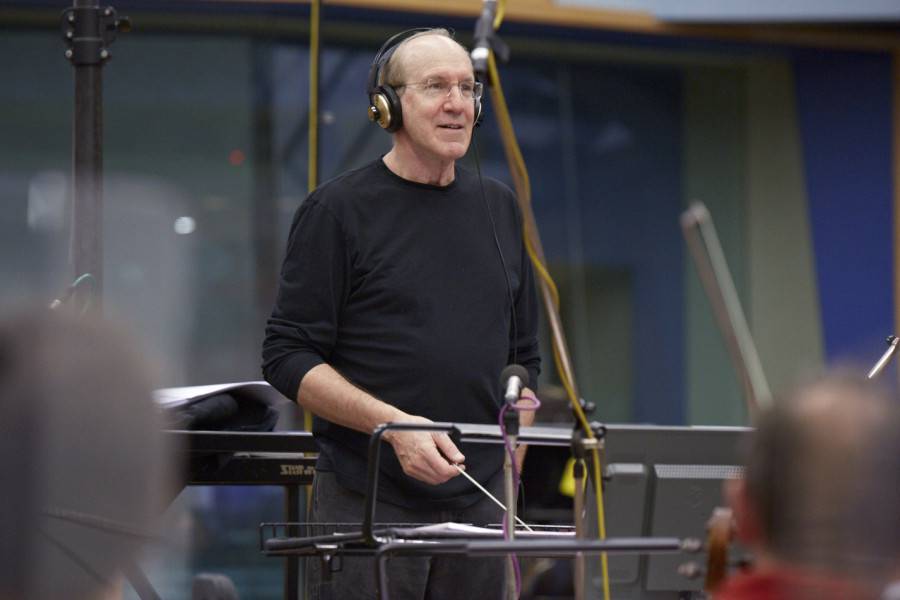
EE: Now, you’ve worked on quite a bit of animated films….
Bill: The first animation I think I did was Tiny Toon Adventures. We were purposely trying to mimic the stylings of the great Carl Stalling. So much of that is really about arranging as opposed to composing. That was something I was very comfortable with so I felt that I did a good job on that. Bruce Broughton was running that program at the time. He seemed to be comfortable with what I was doing so I got a lot of experience there. That’s how things seem to have evolved for me. Having done Tiny Toon Adventures may have lead to doing Thumbelina with Barry Manilow…and then getting a few things on my own. The last animated score I did was for “The Tale of Despereaux” with Gary Ross. He’s an amazing writer and director and that was a terrific experience.
Ee: Now, we can’t talk about your work without touching on Harry Potter and the Chamber of Secrets, which was over ten years ago. What do you remember about it and how was that experience?
Bill: I don’t know what to say about the Harry Potter experience other than the fact that it was a complete honor for me. It was a wonderful experience. I have such great respect and admiration for John Williams. He seems to be such a uniquely talented genius
I was involved because of a conflict in John’s schedule. As he explained it to me, he was unable to devote the time to the score for the second Harry Potter film that he felt it deserved. I believe he worked out a solution that was satisfactory to the parties involved. Basically I was there to adapt the music from the first Harry Potter film into the score for the second film, “The Chamber of Secrets”.
In addition, John would write the new material that would be necessary. I would use material from the first score and the new material he would write to create the score for the second film.
EE: For me on the listening end, I was really interested in hearing if it was going to be different but it was really just perfect the way it turned out and I was extremely happy with it. How anxious were you while working on it?
Bill: I was very anxious about it as you can you imagine! Sitting down with John Williams and having him say to me something like “Well, Bill, here’s what I’d like you to do…” I remember getting up and laughing as I said “I think you made a mistake Mr. Williams! There’s nobody that will be able to fill those shoes…and certainly not me!” He laughed and suggested I sit down and hear him out. That was a part of our initial meeting.
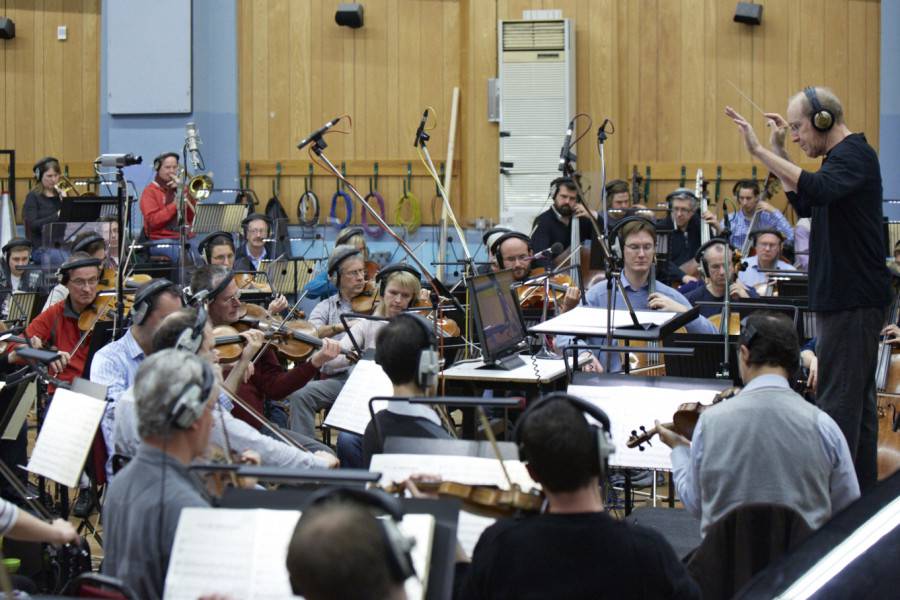
EE: How did you and John Williams first meet?
Bill: That was my first real meeting. I had met him in those “receiving lines” at various functions. The kind of thing where you can express your congratulations and admiration for someone’s work. Sitting with him in his office however was the first time I had really had the chance to meet and talk with him.
As I mentioned before, I was there because of a conflict in his schedule. He had asked if I would come in and meet with him about a project. I didn’t really know much about what he wanted to discuss. At that meeting he told me how much he enjoyed the Harry Potter films and how much he wished he could devote the time to the second film. He had apparently worked out an option with Warner Bros. and the filmmakers where he would write new material for the second film, and oversee the adaptation of music from the first film into the score for the second film. Somehow he had come up with my name and asked me if I would be interested.
EE: Let’s talk about the recent Academy Awards which you also worked on. You were located off-site. How does that even work?
Bill: This was the third time that I’ve been the Music Director of the Oscars and it’s quite a unique experience. It’s really like no other job! It requires a massive amount of attention to detail, organization and planning. This year was no exception. I believe it was the most music they’ve ever had in an Oscar show. That’s what I was told. Whether it’s the truth or not, I don’t know, but in any case it was a lot of music.
This year the orchestra was at Capitol Studios for the show and telecast. There was a specific reason for it. The set and stage designers for the show had built the stage out over the pit. It went several feet in front of the pit. Once they did that they filled the area below that stage… the pit… with equipment like computers and hydraulics for things like elevators, pop-up microphones, etc. I went and looked at it and there was definitely no room for 60 musicians! My options were to use some kind of banquet room at the Dolby… carpet, low ceilings, not a good recording environment at all…that they could try to turn into a decent audio environment, or I could stay at Capitol for the show itself. For several years the Academy has used Capitol Studios to rehearse the music for the show and do any kinds of pre-records if they are necessary.
I chose to remain at Capitol and do the show from there. It’s a wonderful recording space and I felt the audio quality of the music that was broadcast would be really excellent.
I was worried about the latency factor, being off-site, but I was told after they did a few tests that the latency was at most about 10 to 12 milliseconds. We worked it out so that the latency wasn’t a big issue. I’m not saying latency is ever a good thing but it was acceptable for what I had to do. If you’re doing play offs and play ons and bumpers, etc, it was something that I don’t think anybody would really notice. I thought it sounded very good and I was pleased with the result. Naturally I would prefer to be at the Dolby, but that option didn’t seem to be a good one.
EE: I recall sitting at home watching it and was dumbstruck on how you were completely down the street in another location and conducting the music so precisely. It was pretty amazing. And there was a lot of music this year… who chose it all?
Bill: In the past the show would often have “generic” play-ons, play-offs, etc. There’s a substantial library of music written by composers like John Green, Henry Mancini, John Williams, Bill Conti and many more. They are wonderful pieces of music written by terrific composers. As wonderful as that music is however, the producers of this years show wanted EVERY piece of music played to be from a film score. They didn’t understand why, in an evening celebrating films, we would not be playing iconic themes and pieces from the many great film scores that have been written.
They wanted ALL the bumpers, the rejoins, the play-ons, etc, to be from those film scores. We would ask people for their top 10 film score themes and many of the lists that came back had certain recurring favorites. Scores like ET, Gone With the Wind, Lawrence of Arabia, Doctor Zhivago, Forrest Gump, The Godfather… these were some of the scores and themes that would appear on most of the lists. So we arranged many of them to fit our needs.
One of things that is important to me when I musically direct the show is what I call the “authenticity” of the music. I don’t like the idea of doing the “feather” theme from Forrest Gump with a big band and strings or arrangements of scores that have nothing to do with the original composition and/or orchestration. It’s really a personal choice for me. It doesn’t mean that it’s wrong for someone else by the way. I want to make that very clear. It’s simply a personal aesthetic. My approach is to get the original orchestrations. John Williams wrote the play-ons for Lincoln. Alexander Desplat looked at what he wanted the music to be for the scores and films he was connected with, and sent us his notes. That’s something I like doing. Whenever possible, I want the people who composed the music to have input. It’s not always possible by the way, but it is something I aspire to as I approach the music in the show. Again I would like to say that my approach does not in any way reflect on anybody who’s ever done the show and done it differently. It’s just a personal choice. There is so much history on that podium and I think it should be treated with the utmost respect.
Now here’s an interesting side note! If the edict is that ALL of the music is from the movies, what do we do to play someone off? Do we use the “generic” piano noodling that is usually how we learn that someone has out worn his or her welcome at the mic? We thought about that for a while and we talked about different pieces of music. I’m not sure who came up with the idea but someone suggested the shark theme from “Jaws”. I thought that was interesting! We checked with John Williams to make sure that it wouldn’t be interpreted with any kind of disrespect. The last thing I would want is to make fun of anything like that. John seemed to think the usage of the shark theme would be in good fun…so we used it several times.
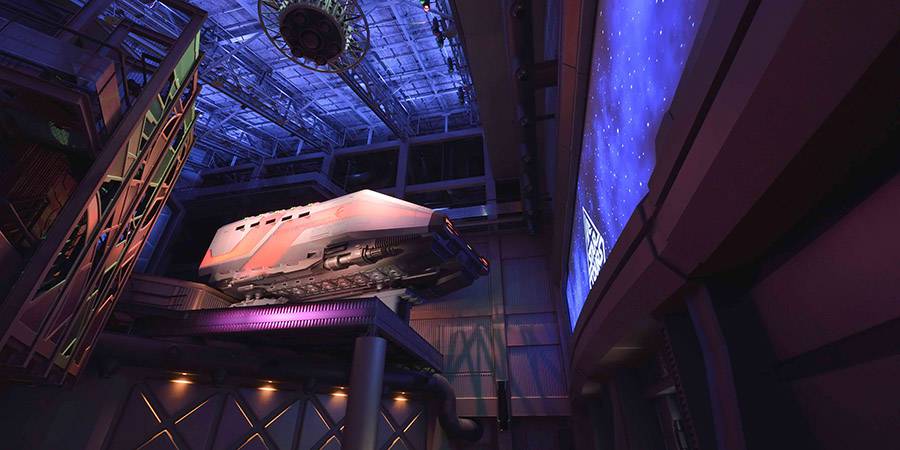
EE: One of the more recent projects you worked on is for the updated Star Tours in Tokyo Disneyland that just opened up. How did that land on your lap?
Bill: I had done a couple things for Disney Imagineering before. One of those was Mickey’s PhilharMagic. John Dennis head of music production for Walt Disney Imagineering called me with the Star Tours project and asked if I was interested. I met with him and I loved the idea of what he wanted to do. I told him that if I got involved however, that I would want the music to be as authentic and true to the original scores as possible. I believe those scores are so iconic and so wonderful. The orchestrations are brilliant. I felt that the music was so familiar that doing it in its original context would help support the idea that the audience was entering the Star Wars universe. I told John Dennis that with that caveat understood, I would love to be involved. He assured me that Disney wanted the same authenticity for the project and that making sure John Williams was “on board” with what was going to be done with the music was a crucial part of the project.
So right away things were moving in what I felt was the appropriate direction. It wasn’t going to be little knock off arrangements or synthesized things. I suggested that we use the London Symphony and, fortunately, the timing worked out wonderfully. I get goose bumps just thinking about the sound of those sessions.We created a kind of 40 minute “suite” of music from the 6 films. We ran it by John Williams and got his approval. I believe everyone involved was happy with the result. I think the “pedigree” of the end product is exactly what it needed to be. I was very happy with how things turned out.
EE: That sounds amazing. Where can this 40-minute chunk of music be heard?
Bill: The way the venue is structured in Tokyo is that there’s a large room like an airport terminal and that’s the first place you enter. It’s different than the Star Tours in Walt Disney World or in Anaheim. It’s a much bigger room and the creators of the ride felt that a 40-minute loop of Star Wars music should cover the most amount of time someone would spend in that initial terminal. When someone leaves the terminal, they go into the Droid Room and then into the ride itself. About a year prior to the Star Tours Tokyo project, I had put together a 10 to 12 minute loop of John’s music for the Droid Room part of Star Tours for the Orlando and Anaheim attraction updates. It was a different type of music…not as bombastic (droids, ewoks, etc) for where the droids are scanning luggage.
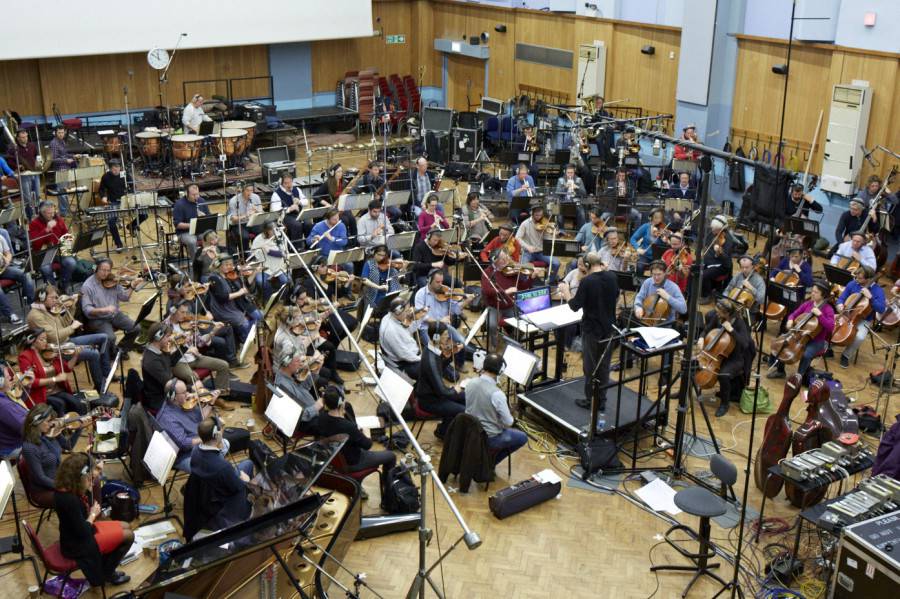
EE: It would be great to be able to hear this music somehow on CD or something…
Bill: I think that would be wonderful. It’s a beautifully recorded piece of music…Abbey Road, the London Symphony Orchestra playing that iconic music! The Star Wars music is in their DNA and they were very happy with it. I think there’s a wonderful degree of integrity to the music and personally believe it would make a wonderful CD…but who knows.
EE: Well all is now said and done and the ride is open, have you had a chance to ride the new Star Tours yet?
Bill: Oh yeah, I love it! It’s just a terrific ride.
EE: Are you a fan of the Disney Parks too? Do you have any other favorite attractions?
Bill: Star Tours is actually one of my favorites. I like Space Mountain too but Star Tours may be at the top of my list. I remember when my kids were younger; I went to the park with my son one rainy spring day. It was wonderful because we would just walk in to Star Tours, do the ride, exit through the gift store, then come back around and go through the ride again. There was almost no line! We did that about 10 times that day until we got a little tipsy. But I am a Star Tours fan and that added to my excitement as I worked on the project.
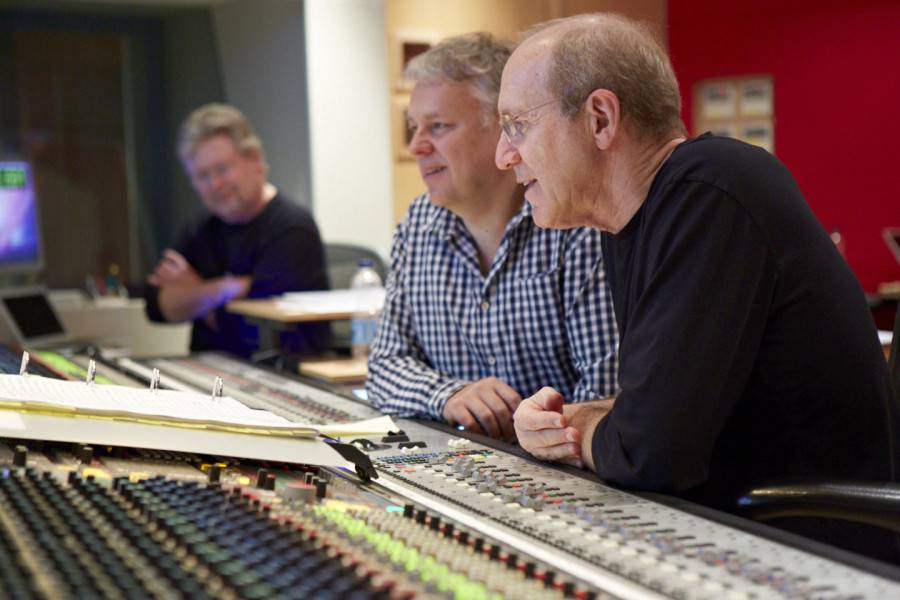
EE: So what’s next for Bill Ross? Anything we can look out for?
Bill: I’m doing a really beautiful movie called “50 to 1” with director Jim Wilson, who produced Dances with Wolves and The Bodyguard. It’s a really sweet film and I love the story but I’ll let you find out all about it.
EE: Well, with everything else you’ve done, we look forward to seeing and hearing it when it’s released! Bill, thank you so much for your time, it’s been great.
Bill: Thanks David. It was my pleasure. I really enjoyed it.
Thanks goes out once again for Bill Ross for the time and a big thanks to Alex Kovacs for all the behind the scenes wrangling!
Abbey Road scoring session photos courtesy of Walt Disney Imagineering.
